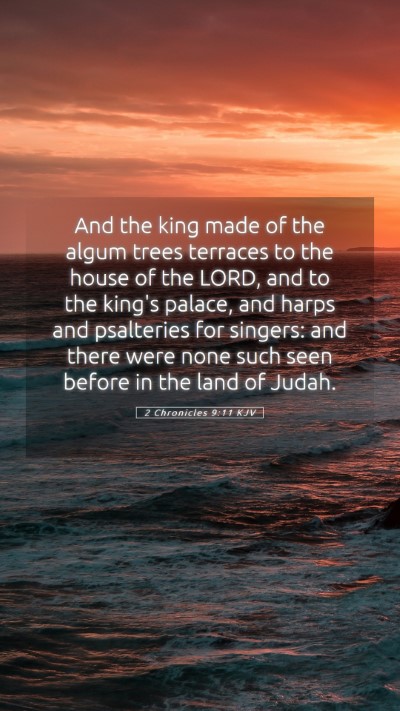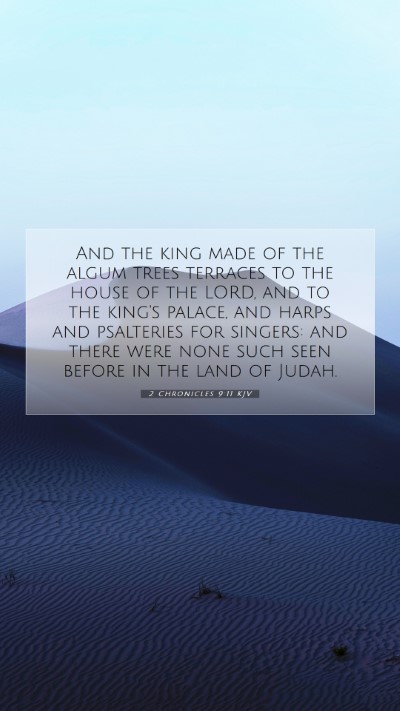Understanding 2 Chronicles 9:11
In this passage, 2 Chronicles 9:11, we witness a pivotal moment in the accounts of King Solomon and the magnificence of his reign. The verse states:
“And the king made of the algum trees terraces to the house of the Lord, and to the king's palace, and harps and psalteries for singers: and there were none such seen before in the land of Judah.”
This verse encapsulates the opulence of Solomon's reign and his dedication to constructing and enriching both the temple of God and his own palace. The verse can be unpacked in several significant ways:
1. Biblical Context and Historical Background
To understand the meaning of this verse, it's important to consider the historical context. Solomon, as King of Israel, was renowned for his wisdom and wealth. His reign is marked by a period of unprecedented prosperity and luxury, described in detail throughout the spectrum of Biblical scripture.
2. Symbolism of the Algal Trees
The use of algum trees (often translated as "almug" or "cypress") is significant. These trees were rare and valuable, symbolizing the richness and resources during Solomon's reign. According to Matthew Henry's Commentary, the high-quality wood represented both the grandeur of God's house and the king's appreciation for beauty in worship.
3. Contributions to the Temple and King’s Palace
Solomon's construction efforts were not merely practical; they were acts of reverence. Albert Barnes remarks on the importance of both the temple and the palace, indicating that each served as a manifestation of Solomon's devotion to God and his responsibility as a ruler. The embellishments made were not for personal gain but an elevation of worship and leadership.
4. The Role of Music in Worship
The reference to harps and psalteries reflects the integral role of music in worship. This aligns with the broader Biblical principle of utilizing artistic expression in honoring God. As noted by Adam Clarke, music in the temple was essential for creating an atmosphere conducive to divine worship and closer communion with God.
5. Implications for Worship and Leadership
This verse serves not only as a historical account but also poses significant implications for leadership and worship. Solomon’s actions exemplify a model for leaders today: enriching their communities and creating space where worship can flourish. The verse can be interpreted as a call to dedicate resources to the things of God, drawing parallels to contemporary application in our communities.
6. Theological Significance
Beyond the literal sense, this verse offers a deeper theological reflection. It highlights the covenant relationship between God and His people, where the prosperity of the king was meant to reflect God’s blessings. The verse serves as a reminder that all gifts come from God, inviting readers into a contemplative aspect of gratitude and stewardship.
Cross References
- 1 Kings 10:11-12 - Describes similar events, noting the source of the wood and the luxury during Solomon's reign.
- 2 Chronicles 2:8-9 - Highlights Solomon's request for building materials to construct the temple.
- Psalm 29:2 - Calls for worship in beauty and holiness, linking back to Solomon's practices.
Conclusion
In summary, 2 Chronicles 9:11 serves as a profound reflection on the intersection of beauty, worship, and leadership in ancient Israel. It encourages a deeper Bible verse understanding and emphasizes the ongoing relevance of Solomon's choices in our pursuit of honoring God today. Engaging with this scripture and others in study groups or online can enrich our comprehension and application of Biblical principles in daily life.
Further Study Suggestions
For those looking to explore more on this topic, consider delving into:
- Bible study guides focused on the life of Solomon.
- Online Bible study sessions discussing leadership in scripture.
- Bible study tools that provide in-depth commentary and analysis.


